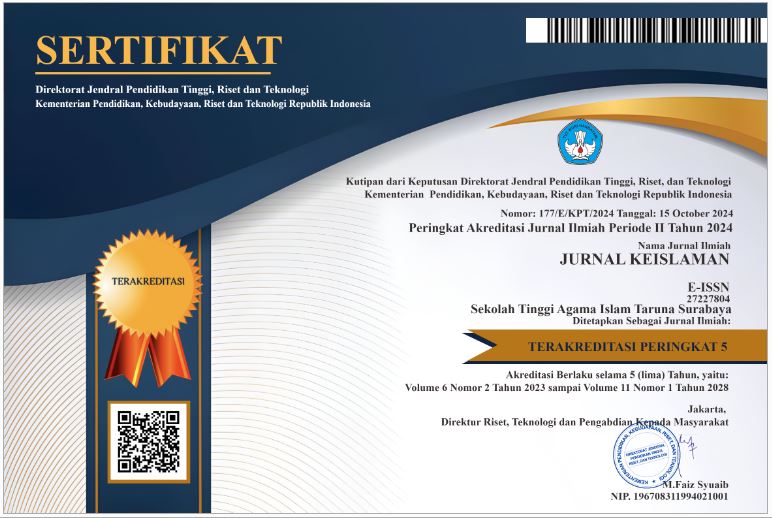Relevansi Dimensi Spiritual Manusia Terhadap Implementasi Pendidikan Karakter
DOI:
https://doi.org/10.54298/jk.v7i1.238Keywords:
human, spiritual, character educationAbstract
This study aims to explore the relevance of the spiritual dimension of humans to the implementation of character education. Through a qualitative approach, this study analyzes spiritual concepts in various religions and philosophies and relates them to educational values. This study used a descriptive qualitative research method. A research approach that aims to describe and understand phenomena that occur in their natural context. This research does not focus on hypothesis testing or statistical generalizations but rather emphasizes a deep understanding of a problem or phenomenon. Researchers use an inductive approach to identify patterns, themes, and characteristics that emerge from the collected data. The results of descriptive qualitative research are in-depth descriptions of the phenomena studied, which can provide rich and contextual understanding. Based on research, it was found that the spiritual dimension of humans and character education are closely related. Character education aims to form good and quality character in individuals, while the spiritual dimension involves understanding and awareness of the nature of self, life, and its creator. The contribution of the spiritual dimension of humans in character education can provide a strong foundation for the formation of individuals with integrity, responsibility, and care for others. The implication of this research is the need to include a spiritual approach in the character education curriculum as an effort to form a generation that has a strong morality and positive attitude towards life.
Downloads
References
Al-Ghazali, Abu Hamid Muhammad. Mishkat Al-Anwar. Vol. 19, 2014.
Al-Ghazali, Imam. Ringkasan Ihya’ulumuddin. Akbar Media, 2008.
Arikunto, Suharsimi. “Prosedur Penelitian : Suatu Pendekatan Praktik / Suharsimi Arikunto | OPAC Perpustakaan Nasional RI.” Jakarta: Rineka Cipta, 2012.
Desmita. “Developmental Psychology”, Psikologi Perkembangan. Rineka Cipta, 2017.
Haryanto, Sri. “BAB III URGENSI PENDIDIKAN KARAKTER.” Membangun Pendidikan Karakter, 2022, 31.
———. “PENDIDIKAN KARAKTER TINJAUAN PSIKOLOGI DAN ISLAM.” PARAMUROBI: JURNAL PENDIDIKAN AGAMA ISLAM 4, no. 1 (2021): 173–79.
———. “Reformulating the Design of Character Education Based on ‘ Spiritual-Religious Values .’” Erudio: Journal of Educational Innovation 9, no. December (2022): 129–35. https://erudio.ub.ac.id.
Maullasari, Sri. “Membumikan Islam.” Pustaka Pelajar 20, no. 1 (2019): 229. dakwah,+Journal+manager,+06_Sri+Maullasari_JurnalDakwah20.1.2019.pdf.
Munawwir, Ahmad Warson. “Kamus Arab Indonesia Al Munawir.” In Cetakan 14, 1997.
Rahardjo, M Dawam. Ensiklopedi Al-Qur’an: Tafsir Sosial Berdasarkan Konsep-Konsep. Diterbitkan oleh Penerbit Paramadina bekerjasama Jurnal Ulumul Qur’an, 2017.
Rivauzi, Ahmad. “Relevansi Pendidikan Berbasis Spiritual Dalam Penguatan Pendidikan Karakter Di Sekolah Dan Madrasah Pada Era Revolusi INDUSTRI 4.0.” Murabby: Jurnal Pendidikan Islam 3, no. 1 (2020): 3. https://core.ac.uk/download/pdf/322629270.pdf.
Shihab, M. Quraish. Kaidah Tafsir. Abd. Syakur Dj. Tangerang: Lentera Hati. Lentera Hati Group, 2013.
Suraji, Robertus, and Istianingsih Sastrodiharjo. “Peran Spiritualitas Dalam Pendidikan Karakter Peserta Didik.” JPPI (Jurnal Penelitian Pendidikan Indonesia) 7, no. 4 (2021): 570. https://doi.org/10.29210/020211246.
Susilo, Wilhelmus Hary. Penelitian Kualitatif: Aplikasi Pada Penelitian Ilmu Kesehatan. Journal Equilibrium. Vol. 5, 2009.
Yunus, Firdaus M. Pendidikan Berbasis Realitas Sosial: YB Mangunwijaya-Paulo Freire. Yogyakarta: Logung Pustaka. Vol. 1, 2007.
Zubaedi. “Desain Pendidikan Karakter.” Journal of Chemical Information and Modeling 5 (2011): 407. http://repository.iainbengkulu.ac.id/4419/1/BUKU DESAIN PENDIDIKAN KARAKTER FIX.pdf.
Downloads
Published
How to Cite
Issue
Section
License
Copyright (c) 2024 Sri Haryanto

This work is licensed under a Creative Commons Attribution-ShareAlike 4.0 International License.
Authors who publish with this journal agree to the following terms:
- Authors retain copyright and grant the journal right of first publication with the work simultaneously licensed under a Creative Commons Attribution-ShareAlike 4.0 that allows others to share the work with an acknowledgement of the work's authorship and initial publication in this journal.
- Authors are able to enter into separate, additional contractual arrangements for the non-exclusive distribution of the journal's published version of the work (e.g., post it to an institutional repository or publish it in a book), with an acknowledgement of its initial publication in this journal.
- Authors are permitted and encouraged to post their work online (e.g., in institutional repositories or on their website) prior to and during the submission process, as it can lead to productive exchanges, as well as earlier and greater citation of published work (See The Effect of Open Access).


















